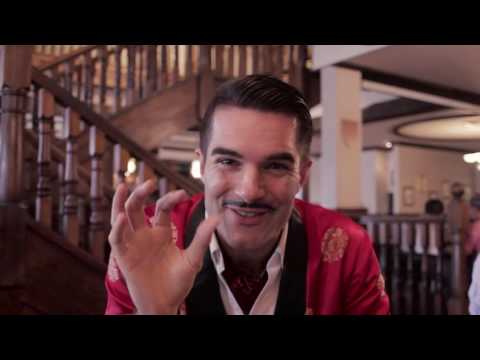 Daniel Page is a freelance script-editor, writer and producer with credits on Newsjack, NewsRevue, 12 sketches in a London Shed and The Sitcom Trials. In this article, the first in a series aimed at helping aspiring comedy writers, Daniel talks about the many opportunities that exist for those willing to embrace the realities of writing comedy.
Daniel Page is a freelance script-editor, writer and producer with credits on Newsjack, NewsRevue, 12 sketches in a London Shed and The Sitcom Trials. In this article, the first in a series aimed at helping aspiring comedy writers, Daniel talks about the many opportunities that exist for those willing to embrace the realities of writing comedy.
Your mum laughs at your jokes. Your friends tell you you’re funny. That thing you do with a box of paper clips is HILARIOUS to your cat (at least you assume that’s why he took a shit in your shoe).
The trouble is, Twitter rarely retweets your jokes, the BBC won’t touch your sketches and Baby Cow won’t read your sitcom. You’re finding it hard to get noticed, find and take opportunities and generally make progress. Also, it burns when you pee, but I’m sadly not going to cover that here.
For me the reason you’re struggling comes down to this – writing comedy is hard. REALLY hard. But here’s the rub… knowing this could make you a stronger writer.
After a few years researching the landscape I’ve found four things that help me improve my writing, challenge my own material and target the best opportunities. I hope this article helps you do the same.
So here’s what I’ve discovered:
- Writing isn’t performance
- Most (not all) of your stuff is rubbish
- Many writers are better than you
- There are opportunities out there begging to be won
Writing isn’t performance
The words you write on a page are not the performance an audience will see. Skilled actors, directors, technicians and producers will turn it into a work of art through a combination of body language, pace, rhythm, emotion, intensity, spotlights, sound effects, timing, panache and biscuits.
Your job is to simply come up with some sure fire material for this group of people to perform. People you’ve possibly never met and whose skills you don’t fully understand.
Somehow you’ve got to get past that and imagine how your words might play out. You’ve got to write words that a bunch of strangers will use to get another even larger bunch of strangers to involuntarily expel air in a staccato manner.
This, is hard.
Witty won’t cut it. Puns = groans. Audiences reach punchlines to obvious jokes faster than then pound drops after a referendum. You’re looking for those 20 words / 90 seconds of tight writing that neatly dissect their target with flow, rhythm and PUNCH. The ones that force an audience spit their warm beer and overpriced cocktails onto their overpriced coats and warm crotches. And not care that they’re doing so, because they’re too busy laughing.
Once you hear that ‘whoomph’ of laughter from a joke YOU wrote you won’t settle for anything less. And nor will producers. Why should they?
Knowing this hopefully tells you two things:
- You could really do with learning how to get there. It’s hard to bake a good cake without having the right ingredients or knowing the recipe, so why do the same with writing?
- If it’s this hard to write to good material, many people will struggle. So if you can consistently hit this standard, chances are you’ll eventually get noticed.
Most (not all) of your stuff is rubbish
A quick glance at my credits page shows I’ve written lots of comedy for lots of people, which suggests I might be good at it. The trouble is you’re only seeing the stuff that made it. The other 80% is basically garbage. Even my joke about colonic irrigation I told them to shove up their arse didn’t work.
Just because I once wrote a gem that once got used on Newsjack doesn’t automatically mean my next piece is any good.
Writing a good joke, sketch or sitcom requires a goodly dollop of inspiration backed up by good execution. Producers will sometimes take a well executed so-so idea, more often take (and re-write) a great idea that’s been badly executed, but will almost alway take a well executed great idea. Does the piece you’ve just written have these qualities?
The trick is to learn to know when you got a gem or a turd on your hands (shoes, face, whatever gets you going really). It’s far better you figuring this out than asking a producer to do so. They get bored of receiving turds and you really want to be remembered as that writer who mainly sends in gems (I tried sending in some Jelly Babies once with my turds…didn’t work).
So try to be really honest with yourself about what you’ve written. Or even better, ask someone else to take a look. Then write another version. Or better still, another sketch. There’s a reason why writing teams start with 100 ideas, write 30 sketches and then record the best 12…
Many writers are better than you
There’s a huge and growing number of comedy writers out there and, quite frankly, many of them are better than me (and probably you). Let’s consider the competition:
- In the UK alone there are easily 1,000s of beginners – writers who enjoy what they do, but lack experience and technique. They may have the odd credit on a podcast or Newsjack, but struggle to regularly turn out quality work or get producers interested. Even so, e-mail and social media makes it possible for them to sneak the odd gem through.
- Then there are the 100s of emerging writers who have mastered the basics and are capable of turning out a decent one-liner or sketch on a semi-regular basis. They’ve got several credits under their belt and are using the power of the community to collaborate, make their good work and put it out there (check out the Kirrin Island Team http://bit.ly/1NWu1cz or the Wooden Overcoats bunch http://bit.ly/1OQptFH). Some of these writers are impressing producers enough to get invited to the Newsjack writers room or tryout slots on ‘The News Quiz’.
- That’s not even counting the slew of Competition Winners who’ve beaten thousands of others to win events like BBC Writersroom, or the Sitcom Mission or Class Dismissed. Producers will definitely be in touch with these guys.
- Now we get to the hundred or so workhorse writers that producers rely on to churn out quality gags for the endless panel and topical news shows. We’re talking established stand-ups, current and former BBC Comedy Bursary writers, New Comedy Award winners… people who know their stuff, are getting paid some money to write some comedy and are just getting better and better.
- After this I’m guessing there are perhaps a few dozen top end UK writers who earn a reasonable living from writing by contributing to mainstream shows, create episodes of a long running sitcom or even writing their own series. And they’re not going anywhere. You need to become better, fresher and more relevant than these guys to lure producers away from them…
- …which is exactly what some writers are doing. These shooting stars are bringing innovative, fresh, smack-between the eyes writing to the table that’s winning awards left right and centre (hi Phoebe Waller-Bridge). Producers will grab onto them as they accelerate towards stardom.
- Mind you, even these writers are having to compete with the twenty or so super-talented, highly experienced industry legends with a rock-solid track record on shows such as ‘The Thick of It’ and ‘Peep Show’. Mind you, even these guys will be pitching against and around the writing royalty whose pop-star reputation means they can probably get a meeting based on name alone.
Place yourself somewhere on the list. Does it help explain why producers aren’t beating a path to your door? But don’t give up just yet, because…
There are opportunities out there begging to be won
I used to think there weren’t enough opportunities for new writers, but I no longer think this is true. If anything it’s the pros who have a legitimate reason to struggle to find work.
There are LOADS of places to submit your work – the industry needs a constant stream of funny material. Shows like NewsRevue have a voracious demand for topical gags and right now Amazon, Netflix and others are battling it out to find great new content.
I’ve talked about the need to get good at making people laugh, the importance of evaluating your own work before you send it out and the need to recognise you’re competing with lots of other writers. Get this right often enough and you’ll start getting noticed. I mean sure, covering yourself in honey and miming Beatles songs will also get you noticed, but the former is better for your career (actually both are good, but I’m allergic to honey, so let’s just drop it okay?).
So armed with this information, you’re going to learn how to write good comedy, find people you trust to give you constructive feedback and find opportunities that play to your strengths and expose other writer’s weaknesses.
In later articles I’ll say a bit more about how and where to find and convert opportunities, but in the meantime here’s a generic worked example:
- Not all writers spot all opportunities. Do you know about www.londonplaywrightsblog.com? Are you signed up to BBC Writersroom Twitter feed or The Comedy Crowd weekly newsletter? Congratulations. Out of a thousand writers you’re now in the top 500 who’ve actually realised there’s a chance to submit something.
- Does the opportunity have a deadline? Do you have the self-discipline to hit it? Great! You’re now in the top 200.
- Does your work meet basic entrance criteria such as the right length or vaguely on topic? You HAVE sent in topical writing for a topical news show? Well in that case Mr ‘I’ve read the instructions’, move on up to the top 150.
- Does your sketch look like a sketch? As in they’ve asked for a sketch and you’ve given them something that follows the basic rules of sketch structure and progression? Holy smokes Batman, you’re now in the top 100!
- Can you spell corroctly? Is your script vaguely formatted? Have you written in short sentences with clear and punchy dialogue? Hurrah! It’ll get more love when it’s read. Moonwalk on to the top 75.
- Have you got any JOKES in there? Like actual jokes that people will laugh at? Yes? Say hello to the top 40 you sly bastard.
- Are these jokes focused around a good premise delivered by funny characters? Does your sketch finish with a decent punchline? Welcome to the top 20. Help yourself to a cigar.
At this point it’s now down to the producer’s preference and little bit of luck, but you’re beaten 985 other writers and have a good chance at getting your work produced.
The numbers are somewhat estimated, but I firmly believe the trend is broadly correct. Producers basically say as much in their blogs (e.g. http://bit.ly/290DAYG and http://bit.ly/298RtY8) and I’ve script-edited shows that follow this pattern.
(Subscribe to The Comedy Crowd weekly newsletter below to make sure you don’t miss out on any opportunities)
In summary
- Learn and master the basics of writing comedy.
- Learn how to assess your writing with honesty and the help of others.
- Find and convert opportunities to get your work out there.
Over the coming months I’ll be publishing lots of articles on the above. Clearly I won’t have all the answers, so I’d welcome your (constructive) comments, corrections and critique as we go on this journey. And after all, the journey itself is just as fun as the destination, right?
Daniel has provided excellent script advice for a number of Comedy Crowd subscribers. To see their testimonials and get advice on your script visit www.coiledslinky.strikingly.com. Comedy Crowd members get a 10% discount!
[icegram campaigns=”10837″]

 Daniel Page is a freelance script-editor, writer and producer with credits on Newsjack, NewsRevue, 12 sketches in a London Shed and The Sitcom Trials. In this article, the first in a series aimed at helping aspiring comedy writers, Daniel talks about the many opportunities that exist for those willing to embrace the realities of writing comedy.
Daniel Page is a freelance script-editor, writer and producer with credits on Newsjack, NewsRevue, 12 sketches in a London Shed and The Sitcom Trials. In this article, the first in a series aimed at helping aspiring comedy writers, Daniel talks about the many opportunities that exist for those willing to embrace the realities of writing comedy.

